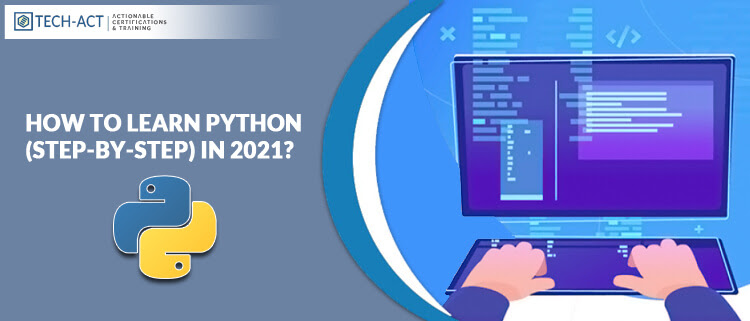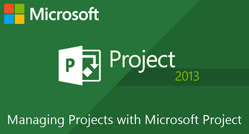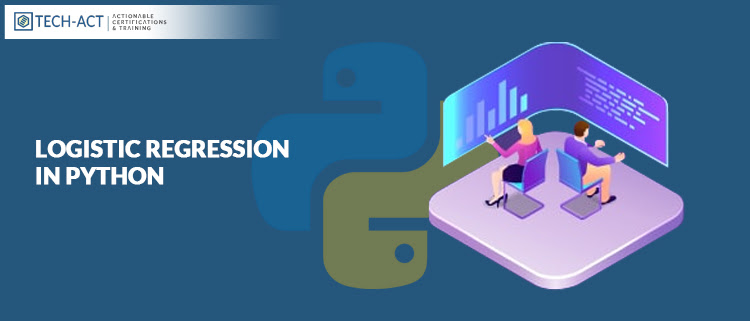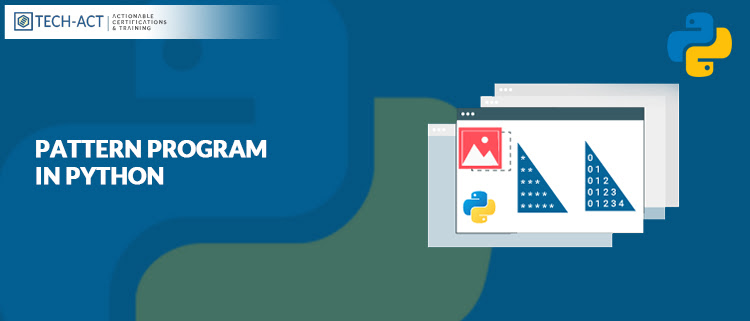How To Learn Python (Step-By-Step) In 2021?

In the recent times, python has gained a lot of popularity in the world of programming language as it is used at a large scale in various fields like data science, web development, software engineering, game development & automation. Hence, many IT professionals want to upgrade their skills by learning python. However, the most difficult and tedious task is to find out how to learn python systematically. And why do I say so? Because most of the python’s learning material are very generic in nature. If you want to learn how to create websites using python then you will have to investment a good amount of time learning python syntax even before you could figure out what really interests you. Hence, one can easily loose interest in learning python because of this entire mismatch.
So today in this blog we will inform you about how you can learn python step by step which will be a blend of both i.e. learning the basics and creating interesting things.
Here, we begin…..
Step 1: Find out what is your motivation to Learn Python:
Prior you jump on to learning python, it is very important for you to know that why you want to learn python. Because learning python will take a lot of efforts and time of yours therefore unless you have the required motivation you will find learning python very difficult. For a instance, when I was in college I could hardly keep my eyes open while learning syntax because of the lack of motivation but when I started working and I had to use python for creating a website that could automatically score online exams I worked really hard day and night to finish it. Hence, finding out what is your motivation will aid you in understanding what your end goal is. That will eventually help you in walking the path without being bored or uninterested. There is no need to find out an exact project but all you need to figure out is the general area that you would be interested in as you prepare to learn python. Below mentioned are the few areas that you could be interested in.
- Data science / Machine learning
- Mobile apps
- Websites
- Games
- Data processing and analysis
- Hardware / Sensors / Robots
- Scripts to automate your work
Choose anyone or in combination the area of your interest so that you can stick to it and accordingly you can design your learning path as you would be building project in those areas in the future.
Step 2: Learn the Basic Syntax:
One can simply not afford to skip this step as learning the basics of python syntax is must before you dive deep into the areas of your interest. There are few recommended sources for learning the basics of python syntax which are mentioned below.
- Learn Python the Hard Way: It is a book that will teach you Python concepts from the basic level to advanced programs.
- Dataquest – Python for Data Science Fundamentals Course: Dataquest makes learning python and data science easier. It teaches python syntax in the context of learning data science.
- The Python Tutorial: The tutorial on python is available on the main python site.
Spending minimum amount of time on learning the python’s basic syntax is good because the faster you get to work on projects, the quicker will be your learning. The ideal time one should invest on learning the basic of python syntax should be like few weeks as you can always refer back to the syntax whenever you feel lost. Also learn python 3 and not python 2 as it is no longer supported.
Step 3: Make Structured Projects:
Post you have gained confidence on the python’s basic syntax then start working on the projects of your own. Because projects enables one to apply the theoretical knowledge practically and therefore they are the best way to learn. You can only retain that knowledge which you have applied practically. Also projects create pressures that bring out your hidden potential plus there is always some new learning and this only adds up to your portfolio making it stronger that makes you more employable. Working on structured projects will be better at the initial phase because freeform project would be quite difficult and you would frequently need to refer the documentation. There are ample of learning resources that provides structured projects and these projects help you in creating interesting things in the areas of your choice and it also prevents you from getting lost. Below mentioned are the some good resources for structured projects in each area:
| Data science / Machine learning | Mobile Apps | Websites | Hardware / Sensors / Robots |
|---|---|---|---|
| Dataquest | Kivy Guide | Flask Tutorial | Using Python with Arduino |
| Python for Data Analysis | Bottle Tutorial | Raspberry Pi Cookbook | |
| Scikit-learn documentation | Learning Python with Raspberry Pi | ||
| Learning Robotics using Python |
Step 4: Work on Python Projects on Your Own:
After working on few structured projects, take some projects on your own for further learning python. Though you would still refer resources and learning concepts but then you would be working on things that you really wished to work for. Making yourself comfortable in debugging errors and issues with your own programs is very important before you start working on your own projects. Below mentioned are few resources that one should know.
- Stack Overflow: It is a community question and answer site. Over here people discuss issues faced during programming.
- Google: It is a very common tool used by seasoned programmer as they find it very helpful for resolving the errors.
- Python documentation: It is one of the best places to find reference material on Python.
Step 5: Keep working on harder projects:
Working on projects which are complex will only add up to your experience and skills. When you reach to a stage where you become comfortable then it the right time to take up something challenging. Few things that you must do while taking up challenging things.
- Teach a new blood about how to build a project you made.
- Ask yourself can you scale up your tool or can you work with more data, or can it handle more traffic?
- Can you get your program run faster?
- Can more people use your tool?
- How would you commercialize your creation?
Summary:
When I talk about python there is a need for continuous learning and simultaneously working on projects and if you do this right way then you would find yourself in a better position after few months. And trust me you will enjoy working in python plus it is rewarding provided you are motivated enough. So if you want to learn python just follow the above mentioned steps for making your learning process effective and enjoyable.
In the recent times, python has gained a lot of popularity in the world of programming language as it is used at a large scale in various fields like data science, web development, software engineering, game development & automation. Hence, many IT professionals want to upgrade their skills by learning python. However, the most difficult and tedious task is to find out how to learn python systematically. And why do I say so? Because most of the python’s learning material are very generic in nature. If you want to learn how to create websites using python then you will have to investment a good amount of time learning python syntax even before you could figure out what really interests you. Hence, one can easily loose interest in learning python because of this entire mismatch.
So today in this blog we will inform you about how you can learn python step by step which will be a blend of both i.e. learning the basics and creating interesting things.
Here, we begin…..
Step 1: Find out what is your motivation to Learn Python:
Prior you jump on to learning python, it is very important for you to know that why you want to learn python. Because learning python will take a lot of efforts and time of yours therefore unless you have the required motivation you will find learning python very difficult. For a instance, when I was in college I could hardly keep my eyes open while learning syntax because of the lack of motivation but when I started working and I had to use python for creating a website that could automatically score online exams I worked really hard day and night to finish it. Hence, finding out what is your motivation will aid you in understanding what your end goal is. That will eventually help you in walking the path without being bored or uninterested. There is no need to find out an exact project but all you need to figure out is the general area that you would be interested in as you prepare to learn python. Below mentioned are the few areas that you could be interested in.
- Data science / Machine learning
- Mobile apps
- Websites
- Games
- Data processing and analysis
- Hardware / Sensors / Robots
- Scripts to automate your work
Choose anyone or in combination the area of your interest so that you can stick to it and accordingly you can design your learning path as you would be building project in those areas in the future.
Step 2: Learn the Basic Syntax:
One can simply not afford to skip this step as learning the basics of python syntax is must before you dive deep into the areas of your interest. There are few recommended sources for learning the basics of python syntax which are mentioned below.
- Learn Python the Hard Way: It is a book that will teach you Python concepts from the basic level to advanced programs.
- Dataquest – Python for Data Science Fundamentals Course: Dataquest makes learning python and data science easier. It teaches python syntax in the context of learning data science.
- The Python Tutorial: The tutorial on python is available on the main python site.
Spending minimum amount of time on learning the python’s basic syntax is good because the faster you get to work on projects, the quicker will be your learning. The ideal time one should invest on learning the basic of python syntax should be like few weeks as you can always refer back to the syntax whenever you feel lost. Also learn python 3 and not python 2 as it is no longer supported.
Step 3: Make Structured Projects:
Post you have gained confidence on the python’s basic syntax then start working on the projects of your own. Because projects enables one to apply the theoretical knowledge practically and therefore they are the best way to learn. You can only retain that knowledge which you have applied practically. Also projects create pressures that bring out your hidden potential plus there is always some new learning and this only adds up to your portfolio making it stronger that makes you more employable. Working on structured projects will be better at the initial phase because freeform project would be quite difficult and you would frequently need to refer the documentation. There are ample of learning resources that provides structured projects and these projects help you in creating interesting things in the areas of your choice and it also prevents you from getting lost. Below mentioned are the some good resources for structured projects in each area:
| Data science / Machine learning | Mobile Apps | Websites | Hardware / Sensors / Robots |
|---|---|---|---|
| Dataquest | Kivy Guide | Flask Tutorial | Using Python with Arduino |
| Python for Data Analysis | Bottle Tutorial | Raspberry Pi Cookbook | |
| Scikit-learn documentation | Learning Python with Raspberry Pi | ||
| Learning Robotics using Python |
Step 4: Work on Python Projects on Your Own:
After working on few structured projects, take some projects on your own for further learning python. Though you would still refer resources and learning concepts but then you would be working on things that you really wished to work for. Making yourself comfortable in debugging errors and issues with your own programs is very important before you start working on your own projects. Below mentioned are few resources that one should know.
- Stack Overflow: It is a community question and answer site. Over here people discuss issues faced during programming.
- Google: It is a very common tool used by seasoned programmer as they find it very helpful for resolving the errors.
- Python documentation: It is one of the best places to find reference material on Python.
Step 5: Keep working on harder projects:
Working on projects which are complex will only add up to your experience and skills. When you reach to a stage where you become comfortable then it the right time to take up something challenging. Few things that you must do while taking up challenging things.
- Teach a new blood about how to build a project you made.
- Ask yourself can you scale up your tool or can you work with more data, or can it handle more traffic?
- Can you get your program run faster?
- Can more people use your tool?
- How would you commercialize your creation?
Summary:
When I talk about python there is a need for continuous learning and simultaneously working on projects and if you do this right way then you would find yourself in a better position after few months. And trust me you will enjoy working in python plus it is rewarding provided you are motivated enough. So if you want to learn python just follow the above mentioned steps for making your learning process effective and enjoyable.





























